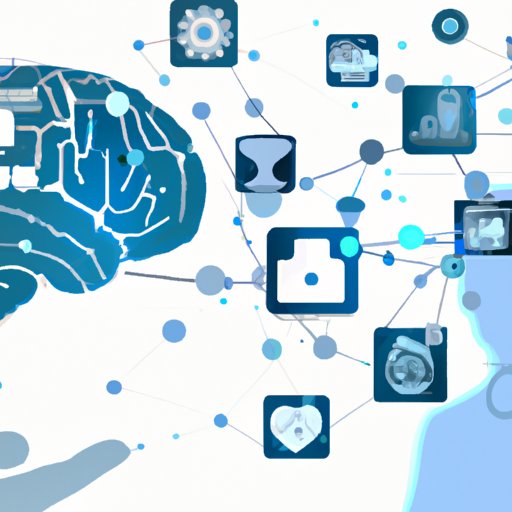Introduction
The rise of artificial intelligence (AI) has led to speculation about its potential to revolutionize many industries, including healthcare. As AI algorithms become increasingly sophisticated and capable of performing complex tasks, questions have been raised about whether they can eventually replace doctors or other medical professionals. In this article, we will examine the potential impact of AI on healthcare and explore the implications for the medical field, physicians, and patients.

Pros and Cons of AI in Healthcare
AI has the potential to bring numerous benefits to the healthcare industry, such as increased efficiency and accuracy of diagnoses, reduced costs, and faster treatment times. AI algorithms can analyze large amounts of data quickly and accurately, which can help clinicians make more informed decisions and improve patient outcomes. For example, AI algorithms can be used to detect and diagnose diseases from medical images such as X-rays and CT scans more quickly and accurately than humans.
However, there are also some potential drawbacks to using AI in healthcare. One concern is that AI may reduce the need for human interaction and intuition. AI algorithms are designed to make decisions based on data, which can lead to a lack of empathy or understanding of a patient’s individual circumstances. Additionally, AI algorithms may not be able to recognize subtle changes in a patient’s condition and could miss important signs of illness.
How AI Could Change the Physician-Patient Relationship
AI could potentially improve accessibility and personalize care by giving patients access to information and advice at any time. For example, AI algorithms could be used to provide personalized health advice based on a patient’s medical history and lifestyle. This could allow patients to make more informed decisions about their health without necessarily needing to consult a doctor.
On the other hand, there is a risk of miscommunication and losing touch with patients if AI algorithms are used too extensively. AI algorithms may be unable to understand a patient’s feelings or provide emotional support, which could lead to a less personal and meaningful physician-patient relationship.
Ethical Implications of AI in Medicine
The use of AI in healthcare raises ethical concerns, particularly around respect for autonomy and patient privacy. AI algorithms rely on collecting and analyzing large amounts of data, which could potentially lead to a breach of patient privacy. Additionally, AI algorithms may not always be able to take into account a patient’s individual circumstances or preferences, which could lead to decisions being made without the patient’s consent.
Another ethical issue is ensuring the quality and accuracy of AI algorithms. AI algorithms are only as good as the data they are trained on, so there is a risk of errors or bias if the data is incomplete or inaccurate. Additionally, AI algorithms may not be able to make decisions that require clinical judgment or expertise, so there needs to be mechanisms in place to ensure that they are being used appropriately.

Existing AI Solutions in Healthcare
There are already a number of existing AI solutions in healthcare, ranging from diagnostic tools to predictive analytics. For example, IBM Watson Health uses AI algorithms to analyze medical records and identify trends and patterns that could help clinicians make better decisions. Other companies, such as Google DeepMind and Enlitic, are developing AI algorithms that can be used to diagnose diseases from medical images more quickly and accurately than humans.
AI algorithms are also being used to improve patient experience and satisfaction. For instance, chatbots can be used to answer common questions, provide personalized advice, and even schedule appointments. Additionally, AI algorithms are being used to streamline administrative processes, such as billing and claims management.

Future of AI and its Role in Medicine
It is difficult to predict the exact role AI will play in healthcare in the future, but experts agree that it will be an important part of the industry. A recent study from Accenture found that AI could save the healthcare industry up to $150 billion per year by 2026. Additionally, AI algorithms could be used to identify and address areas of unmet need, such as diagnosing rare diseases or providing mental health services.
When implementing AI technologies, it is important to consider the ethical implications and ensure that the technology is being used responsibly. Additionally, there should be safeguards in place to ensure that AI algorithms are not making decisions without consulting a human expert. Finally, it is important to keep in mind that AI algorithms cannot replace the human element of healthcare and should be used to supplement, rather than replace, the work of medical professionals.
Conclusion
In conclusion, AI has the potential to revolutionize healthcare and bring numerous benefits to the industry, such as increased efficiency, accuracy, and cost savings. However, there are also potential drawbacks to using AI in healthcare, such as a lack of human interaction and ethical considerations. When implementing AI technologies, it is important to consider the ethical implications and ensure that the technology is being used responsibly. The future of AI in healthcare is still uncertain, but it is clear that it will play an important role in the industry for years to come.
(Note: Is this article not meeting your expectations? Do you have knowledge or insights to share? Unlock new opportunities and expand your reach by joining our authors team. Click Registration to join us and share your expertise with our readers.)
